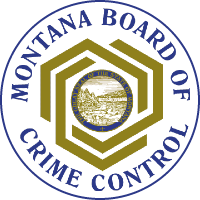Recognition Awards
Lifetime Achievement Award (LAA)
The Lifetime Achievement Award is presented to a deserving individual (or group of individuals) who has achieved professional excellence and made lasting contributions to improve Montana’s justice system throughout their career. This award encompasses professionals across the entire justice system and includes law enforcement, crime prevention, public safety, victim services, juvenile justice, forensic science, prosecution, public defenders, courts, corrections and volunteers. The award honors an individual’s proven leadership, vision, and innovation in their field.
Award nominations for the 2026 LAA are due by August 8, 2026.
Innovative Community Improvement Award (ICIA)
The Innovative Community Improvement Award is presented to a deserving individual (or group of individuals) who has, through a specific campaign or program, made lasting contributions to promote public safety and crime prevention within their community. This may include improving the quality of life, reducing the fear of crime, enhancing services to victims or initiating measurable, positive results. For the purposes of this award, a community is defined as a social unit of any size within Montana that shares common values, and may include towns or cities, a county, a specific region, an Indian reservation, etc. A community is not defined as the entire state. This award encompasses any professional or private community citizen or citizens, or a combination thereof. The award honors an individual’s proven leadership, vision, and innovation resulting in lasting contributions and significant improvements to their community.
Award nominations for the 2026 ICIA are due by August 15, 2026.
2025 Award Winners
2025 Lifetime Achievement Award Recipient
Guy Baker
 Detective Guy Baker
Detective Guy BakerGuy Baker is a thirty-five year-veteran of the Missoula Police Department, with over twenty-five years of experience as a detective. He spent the first five years of his career working Uniform Patrol, then was assigned to the Street Crimes Unit for five years before transitioning to investigations. As a detective, he’s been a lead investigator or case agent on over 1,200 state and federal criminal cases, primarily focusing on violent crimes. During the past fifteen years, he has been assigned to an FBI Safe Streets Task Force that targets offenders engaging in gang, gun and drug violence.
He has conducted numerous high-impact investigations involving adult and minor sex trafficking and child sexual exploitation that’s resulted in successful prosecutions in state and federal courts. Baker has also served for over a decade with the United States Attorney’s Office Human Trafficking Task Force for the District of Montana. As a certified instructor through the Montana Law Enforcement Academy and a contracted trainer through the National Gang Center, Baker has trained several thousand law enforcement and justice system professionals on various topics related to street gangs and sex trafficking. He has also conducted hundreds of presentations for schools and communities to increase public awareness on street gangs and sex trafficking.
Baker currently serves as Senior Vice President of the Northwest Gang Investigators Association and is on the Executive Board of the K9 Task Force. He is a past President of the Montana Violent Crime Investigators Association, a former Vice President of the Mountain States Tactical Officers Association and held memberships with the California Gang Investigators Association and the Montana Narcotics Officers Association. Baker also served sixteen-years as an operator and Assistant Team Leader on the Missoula Police Department’s SWAT Team.
During his career, Baker has twice been selected Officer of the Year and been a recipient of a Life Saving Medal, Police Medal, Meritorious Achievement Medal and two Meritorious Service Medals from the Missoula Police Department. While a Task Force Officer, he’s received an Exceptional Service Award and two Director’s Awards from the Federal Bureau of Investigation and a Victim’s Service Award from the United States Attorney’s Office.
2025 Innovative Community Improvement Award Recipient
Georgia Bruski
 Georgia Bruski
Georgia BruskiGeorgia Bruski is a Montana native growing up on ranches located in Roundup and Big Timber. She graduated from Sweet Grass High School and is a graduate of Montana State University. Georgia’s emphasis was and continues to be communications.
Georgia has been employed by Carter County since 1993 starting with the Conservation District. It was in 2010 she became the administrator for the Carter County Sheriff’s Office and Carter County Rural Fire Department. It was with these two positions that set Georgia up to also take on the Emergency Management Position with Carter County DES.
These combined roles placed Georgia in a position to ultimately work on writing grants to secure funding for the necessary tools for the deputies, fire fighters and first responders to safely do their jobs. This is where Georgia found her passion with both verbal and written communications.
Georgia places a high importance on networking not only on a local level but statewide. Georgia is an active member of the Montana Emergency Managers Association. She served as Vice President and President for five years. It was in the Fall of 2019 Georgia was appointed by Governor Bullock to the Montana State Emergency Response Commission where she served until 2023. She was also a member of the Montana Senior Advisory Committee during that time.
On the local level Georgia has served on the school board, community improvement board and in 2018 was voted onto the hospital board, Dahl Memorial Healthcare Association. She served two years as vice chairperson and is currently in her third year as Chairperson of the Board. It is through community involvement and local networking that has strengthened the bond of the local stakeholders and enabled Georgia to be a public servant serving the citizens of Carter County and Southeastern Montana.
2024 Award Winners
2024 Lifetime Achievement Award Recipient
Marty Lambert

Marty spent his entire legal career as a public servant. He was an intern in the Gallatin County Attorney’s Office while attending law school at the University of Montana, and then began working as a Deputy County Attorney there in 1983, shortly after graduating from law school. Marty was appointed Gallatin County Attorney in 1997 and was re-elected to the position every four years until losing a close election in 2022. After his defeat in 2022, Marty continued to serve the public by helping the Yellowstone County Attorney’s Office prosecute complex criminal cases, primarily homicides and sex cases. Marty left us suddenly and unexpectedly, from medical complications from a surgery. He continued to serve and give until the very end. To understand Marty’s lifetime of service, first you need to appreciate his role as a prosecutor.
Montana changed greatly from 1983 to 2024. Prosecution changed, as well. Over the course of those years, law enforcement and prosecutors learned and incorporated computers, digitization, cell phones, ubiquitous video, social media, and DNA evidence into their investigations, case development, and jury presentations. Marty not only learned and mastered these ever-changing realities of life and the courtroom, but he trained his own team and other prosecutors across the State to use them effectively. As Marty gained experience as a prosecutor and leader, he embraced innovation to improve services for victims and rehabilitation for offenders. He fought for more resources to hire Victim Advocates, advocated for Sexual Assault Nurse Examiner positions at hospitals, embraced the need for Child Advocacy Centers to help child victims and witnesses, supported mental health crisis care centers, helped start the first Drug Treatment Court in the State, and co-chaired an offender re-entry program to reduce recidivism among recently released defendants. These programs not only improved legal outcomes for criminal cases, but they also helped the community tackle the root causes and the effects of crime.
Marty’s leadership and innovation went beyond the confines of Gallatin County. He served as a leader and mentor to law enforcement officers and prosecutors across the State of Montana. Marty was an active leader in the Missouri River Drug Task Force, which grew from 3 to 6 counties and ultimately a dozen agencies under his leadership. He also helped lead the Montana County Attorneys Association to train prosecutors and coordinate their voice on public policy issues. Marty selflessly mentored attorneys all over the State, and he tirelessly traveled to the Legislature to advocate for sound public policy in areas of public safety. He also wrote and submitted amicus briefs to the Montana Supreme Court on behalf of the Association when needed.
Marty was a lawyer’s lawyer, a prosecutor’s prosecutor, and a friend’s friend. He served for a lifetime and achieved justice for many.
Montana changed greatly from 1983 to 2024. Prosecution changed, as well. Over the course of those years, law enforcement and prosecutors learned and incorporated computers, digitization, cell phones, ubiquitous video, social media, and DNA evidence into their investigations, case development, and jury presentations. Marty not only learned and mastered these ever-changing realities of life and the courtroom, but he trained his own team and other prosecutors across the State to use them effectively. As Marty gained experience as a prosecutor and leader, he embraced innovation to improve services for victims and rehabilitation for offenders. He fought for more resources to hire Victim Advocates, advocated for Sexual Assault Nurse Examiner positions at hospitals, embraced the need for Child Advocacy Centers to help child victims and witnesses, supported mental health crisis care centers, helped start the first Drug Treatment Court in the State, and co-chaired an offender re-entry program to reduce recidivism among recently released defendants. These programs not only improved legal outcomes for criminal cases, but they also helped the community tackle the root causes and the effects of crime.
Marty’s leadership and innovation went beyond the confines of Gallatin County. He served as a leader and mentor to law enforcement officers and prosecutors across the State of Montana. Marty was an active leader in the Missouri River Drug Task Force, which grew from 3 to 6 counties and ultimately a dozen agencies under his leadership. He also helped lead the Montana County Attorneys Association to train prosecutors and coordinate their voice on public policy issues. Marty selflessly mentored attorneys all over the State, and he tirelessly traveled to the Legislature to advocate for sound public policy in areas of public safety. He also wrote and submitted amicus briefs to the Montana Supreme Court on behalf of the Association when needed.
Marty was a lawyer’s lawyer, a prosecutor’s prosecutor, and a friend’s friend. He served for a lifetime and achieved justice for many.
2024 Innovative Community Improvement Award Recipient
Northern Lights Family Justice Center

Northern Lights Family Justice Center (Northern Lights) is Montana’s first affiliated Family Justice Center of the Family Justice Center Alliance.
Originally, a dream envisioned by AmeriCorps member, Ellie Stanton and Billings Police Officer Katie Nash, a domestic violence investigator, over the course of years of planning, promoting, and advocacy, Northern Lights is now a reality within the Billings community supported and majority funded by Billings City and Billings YWCA.
Every year, domestic violence victims hesitate to call police for help and they may have to travel to multiple places for help and safety. Victims are already near their limit, and the added stress and complexity of having to seek resources from multiple agencies may cause them to withdraw from the process. The idea is to create a one-stop location where victims can receive all the assistance they need from various agencies involved in addressing family violence and abuse.
Northern Lights is a holistic, coordinated, centralized hub of caring professional providers with interdisciplinary offices for law enforcement, prosecutors, civil legal aid attorneys, clerks of court, and more. Under the model that everyone deserves safe and healthy relationships, Northern Lights centralizes the experience of multi-facetted safety planning to reduce the risk associated with dangerous disentanglement from unsafe and unhealthy relationships.
Northern Lights allows individuals to self-identify their needs, individualize their selection of providers allowing them to be the experts accounting for their safety, autonomy, health, and wellness potential so the professionals can honor them as they are (race, sex/gender, sexuality, socio-economic status, ability status, immigration status, religion, etc.).
Northern Lights is a beacon for light. The Family Justice Center model is a new era in addressing interpersonal and generational violence by prioritizing community, belonging, and hope.
For more information about Northern Lights Family Justice Center, please visit
2023 Award Winners
2023 Lifetime Achievement Award Recipient
Barbara Monaco
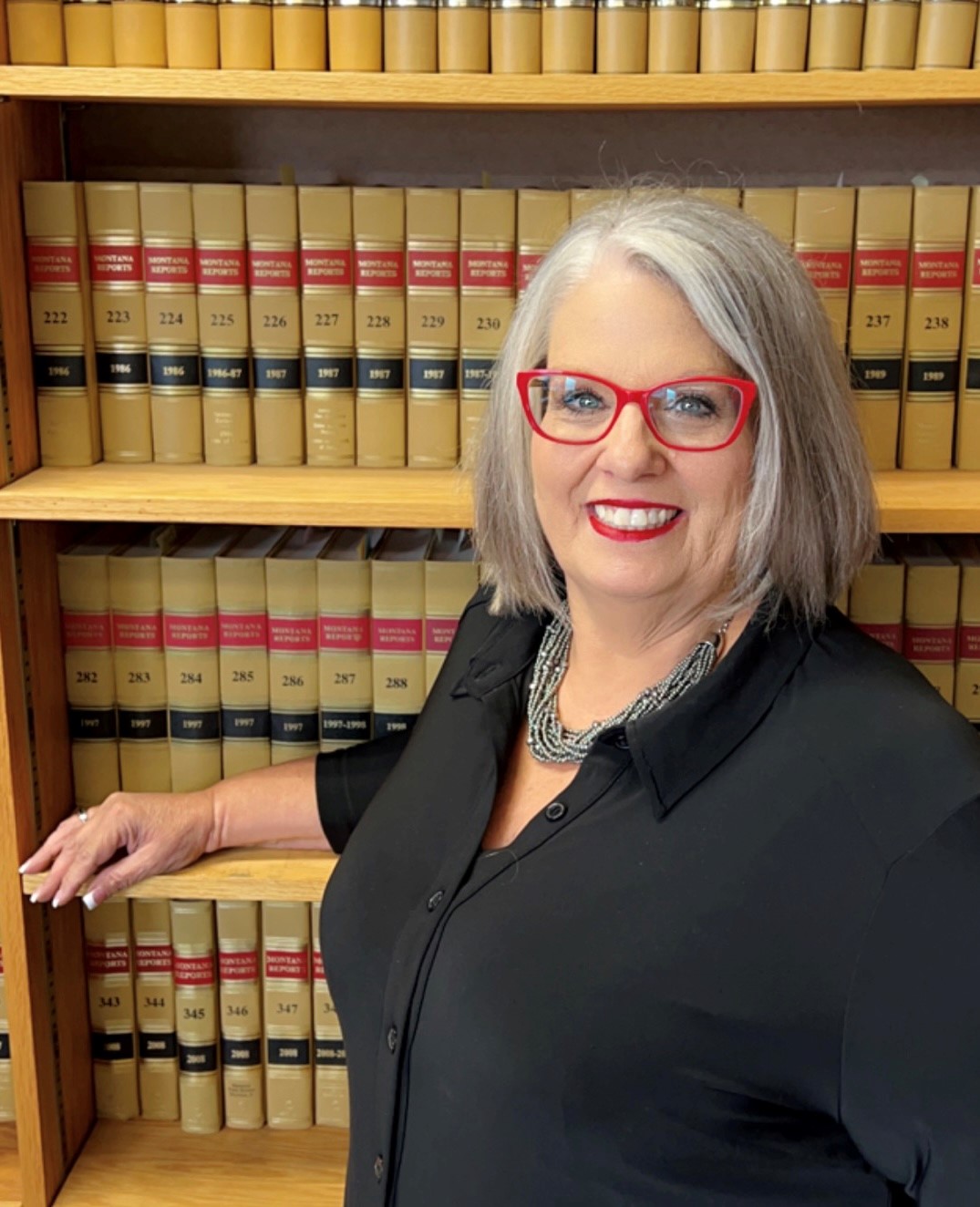
Barbara Monaco has served as a juvenile probation officer in Lake and Sanders County for 37 years (since 1986) and has served as Chief Probation Officer of the 20th Judicial District Youth Court since 1989.
Barbara puts her whole heart and self into the safety and well-being of our community. She goes above and beyond in her duties, not just making sure diversionary processes are in place, but also helping youth become productive citizens. She is the type of person who will purchase shoes out of her own pocket for a student to participate in a program.
Barbara understands the high stakes of the clientele she is serving, many of which have never had a figure in their life to hold them accountable until they met her. She assists law enforcement in legal and mentorship opportunities to correct criminal behavior in youth. Additionally, she often visits local schools and talks to students both on formal and informal probation as well as students in danger of citations with the hope to change their behaviors for the better and avoid the legal system. Many of these youths have Barbara to thank for providing them with necessary direction in life and have gone on to do great things.
Barbara has been on many community boards, clubs, and agencies during her tenure, including Kiwanis, Court Appointed Special Advocates (CASA), the Boys and Girls Club of the Flathead Reservation and Lake County, and Montana Juvenile Probation Officers Association to name a few. She is a part of the Sex Offender Treatment Association (MSOTA) and takes on some of the worst sex offense cases that come into the Youth Court system.
She helped establish, and served as an instructor for, the Montana Juvenile Probation Officers Training, which continues to this day. Following the last legislative session, Barbara organized an Interdisciplinary Task Force for youth consisting of law enforcement, area superintendents, and the head of Child Protective Services in their area.
She is also an experienced fundraiser and creates opportunities like the “Festival of Trees” to raise money for guidance homes and critical projects for the welfare of children and a highly successful annual golf tournament for the CASA program in Lake and Sanders counties and the Confederated Salish Kootenai Tribe.
Barbara has been a tremendous asset to the 20th Judicial District and the State of Montana over her 37-year career. She will retire in October 2023, and MBCC is honored to send her off with the well-deserved honor of Lifetime Achievement Award!
2023 Innovative Community Improvement Award Recipient
Center for Restorative Youth Justice
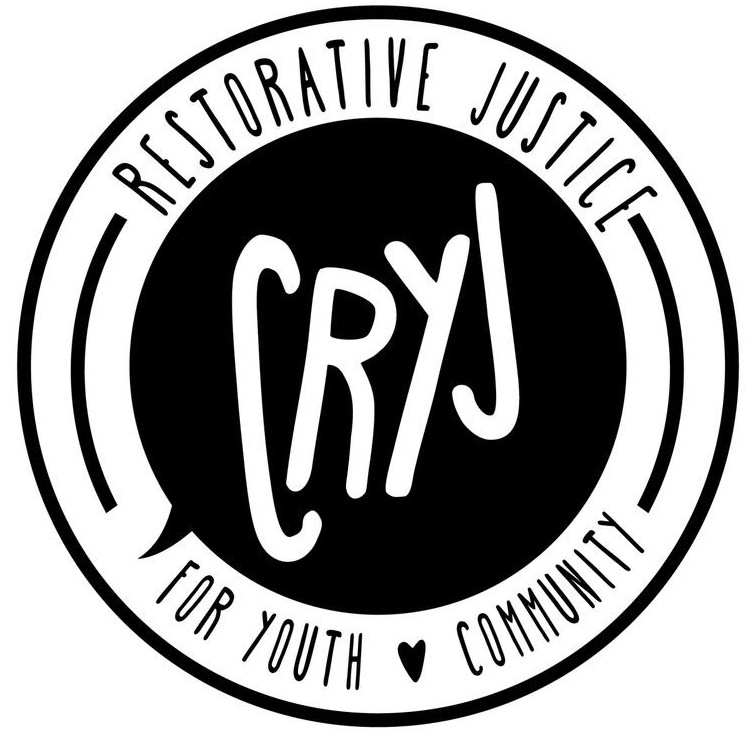
The Center for Restorative Youth Justice (CRYJ) serves teens and families, justice agencies, and schools in the Flathead Valley. CRYJ utilizes restorative justice circles to hold space for dialogue between youth, families, and community members. Alongside restorative conferencing, CRYJ engages teens in service-based activities, empowerment and harm reduction-based workshops, and high levels of individualized adult and peer support.
CRYJ remains committed to helping teens find their strengths and move out of cycles of harm, incarceration, poverty, violence, and a lack of connection to school and community. More specifically, CRYJ offers youth court diversion by providing an opportunity for teens to take accountability and find support after an incident occurs while avoiding further involvement within the criminal justice system. CRYJ’s partnership with Flathead Valley school administrators and School Resource Officers allows teens to be referred to CRYJ in response to both escalating behavior and acute school-based incidents. This represents an earlier-stage diversion than our Youth Court Services partnership provides, creating an alternative avenue for addressing harm while reducing the use of exclusionary discipline policies. This methodology creates safer schools and safer communities within both the immediate and long-term.
School connectedness, defined as the extent to which a student feels accepted, valued, respected, and included in the school, has been strongly correlated with a high rate of school attendance and course completion, lower rates of problematic mental health symptoms, and a decrease in juvenile delinquency and crime. Likewise, students who are suspended from school are more likely to be arrested and involved in the juvenile justice system. The CRYJ Teen in Residence (TR) Program offers youth identified as both particularly at-risk and natural leaders in workshops the opportunity to work with CRYJ’s team as paid staff members. These positions empower former CRYJ participants with leadership, social, and job-based skills, thus creating long-term, positive, alternative pathways for teens.
CRYJ is Montana’s only youth-based restorative justice organization. No other organization offers the wide range of services offered by CRYJ. The services create immediate and long-lasting benefit to all those directly served and to the greater community by decreasing the likelihood of involvement with the criminal justice system through the course of a persons life. From the public health lens, research shows that education and involvement with the criminal justice system are the most modifiable and most influential social determinants of life-long health.
CRYJ is an incredible asset to the Flathead Valley and the state of Montana would greatly benefit from the creation and expansion of more programs like the ones offered through CRYJ.
For more information about Center for Restorative Youth Justice, please visit their website at: https://restorativeyouthjustice.org/
2022 Award Winners
2022 Lifetime Achievement Award Recipient
Tammy K Plubell

Tammy has been an innovator and leader in Montana criminal justice for 37 years. Tammy’s career in the justice system started in law school in 1985 when she and other women drafted and pushed through passage a forward-thinking bill to protect victims of partner abuse. Later, as an intern prosecuting misdemeanors in the Billings City Attorney’s Office, Tammy offered training to officers on the new partner abuse law.
She has not slowed down. In 1987, earning $18,000 a year at the Cascade County Attorney’s Office, Tammy willingly took on the most demanding and emotionally taxing caseload: youth in need of care cases and all assaults and sexual offenses against children. Long ago, a Tribune article addressed crimes against children and interviewed a young victim of a sex crime. Referring to Tammy, the child explained, “The first thing you do is get a great attorney.”
Defense attorneys who underestimated that young, diminutive, inexperienced woman made a costly tactical error. Working with children, families, social workers, law enforcement, and the medical community, Tammy recognized the need for reform. Children, already once victimized, were getting roughed-up by a system that was supposed to protect them. Consequently, Tammy was one of the driving forces behind the child evaluation center in Great Falls, an innovative all-in-one facility, kinder to children and more effective for the professionals who work with those children. Tammy also overhauled the Cascade County youth in need of care system to create a model program, protecting children while scrupulously protecting parents’ rights.
After eight years as a county prosecutor, Tammy moved to Helena. In the mid-1990s, she headed a commission to study criminal sentencing policy. In public hearings across the state, Tammy listened to everyone involved in the justice system. Tammy prepared a comprehensive report for improving the system which included more community-based treatment of nonviolent offenders. Years ahead of her time, many of Tammy’s visions from the mid-90s were finally implemented in 2017 when the Legislature revamped large swaths of the sentencing system.
After the sentencing commission, Tammy became an assistant Attorney General in DOJ’s Appellate Bureau. After serving for years she was named bureau chief in 2020. Under five AGs, Tammy has represented the state in many hundreds of cases on appeal to the Montana Supreme Court and in many complex federal habeas corpus cases. She has shouldered Montana’s most egregious, notorious, and challenging cases and never waivers even in cases lasting many years.
She has given criminal law seminars to prosecutors and judges and is the “go to” source when a County Attorney has a vexing legal problem. Knowing victims and local prosecutors are depending on her, Tammy is never out-prepared or out-worked. Tammy’s service, professionalism, vision, innovation, grit, and commitment set her apart. That is why she is invariably successful and her record shows it.
2022 Innovative Community Improvement Award Recipient
Lea Ponokaakii Wetzel

Lea Wetzel has lived in Great Falls for 20 plus years and has been a pivotal leader in the Great Falls community and justice system. She works with people in recovery and American Indians as a recovery coach and peer support specialist, and works within the courts and recovery support programs in an innovative and tribally inclusive manner.
As a survivor of human trafficking, Lea has risen up from her experience and become a fighter for those that may have no voice. She speaks from experience and has instant connections in her supportive role. She has developed Missing and Murdered Indigenous People (MMIP) awareness campaigns and promoted awareness, support systems, and cultural connections through the news, podcasts, and television. Recently, she has taken on an active role in the MMIP as the Vice President of the North Central Montana task force.
Lea graduated from the 8th Judicial Drug Court program and was recruited in to help update their approach when dealing with women and American Indians. She has worked as a Cultural Awareness and Sensitivity Trainer, Warrior Down Talking Circle Facilitator, a Peer Supporter for the 8th Judicial Veterans’ Court, and represents the state tribal Peer Supporters. Her testimony in Correcting Treatment in Corrections, a book developed by employees of Riverside Women’s Trauma Treatment Center, helped pave a way for new approaches in healthy healing work within treatment and justice systems as she was recruited to be a member of the Criminal Justice Sub-committee in Great Falls.
Additionally, Lea created a tribal relations initiative for Peer Support to better care for tribal people. She is working on gaining representatives from various regions in the state to develop a subcommittee to make decisions and developments going forward. She has led an initiative providing trainings to tribal colleges to implement their own tribal ways, language, and belief systems to support and educate people in recovery.
Lea is also the technical assistant for the state drop-in center and has created three tribal drop-in centers. She assisted in the pilot project with the 8th Judicial Veterans Court to support the First Nations dynamics into their program showing this allows better connection and support to share our ways.
Lea Wetzel is not afraid to stand up and speak for those in need, and she lives her peace through her cultural connections and teachings. She has reconnected to the beauty and strength of her people as a Blackfeet (Piikuni) woman to make a difference and help those in need all while being a loving and caring mother of two.
2021 Award Winners
2021 Lifetime Achievement Award Recipient
Ted Lechner
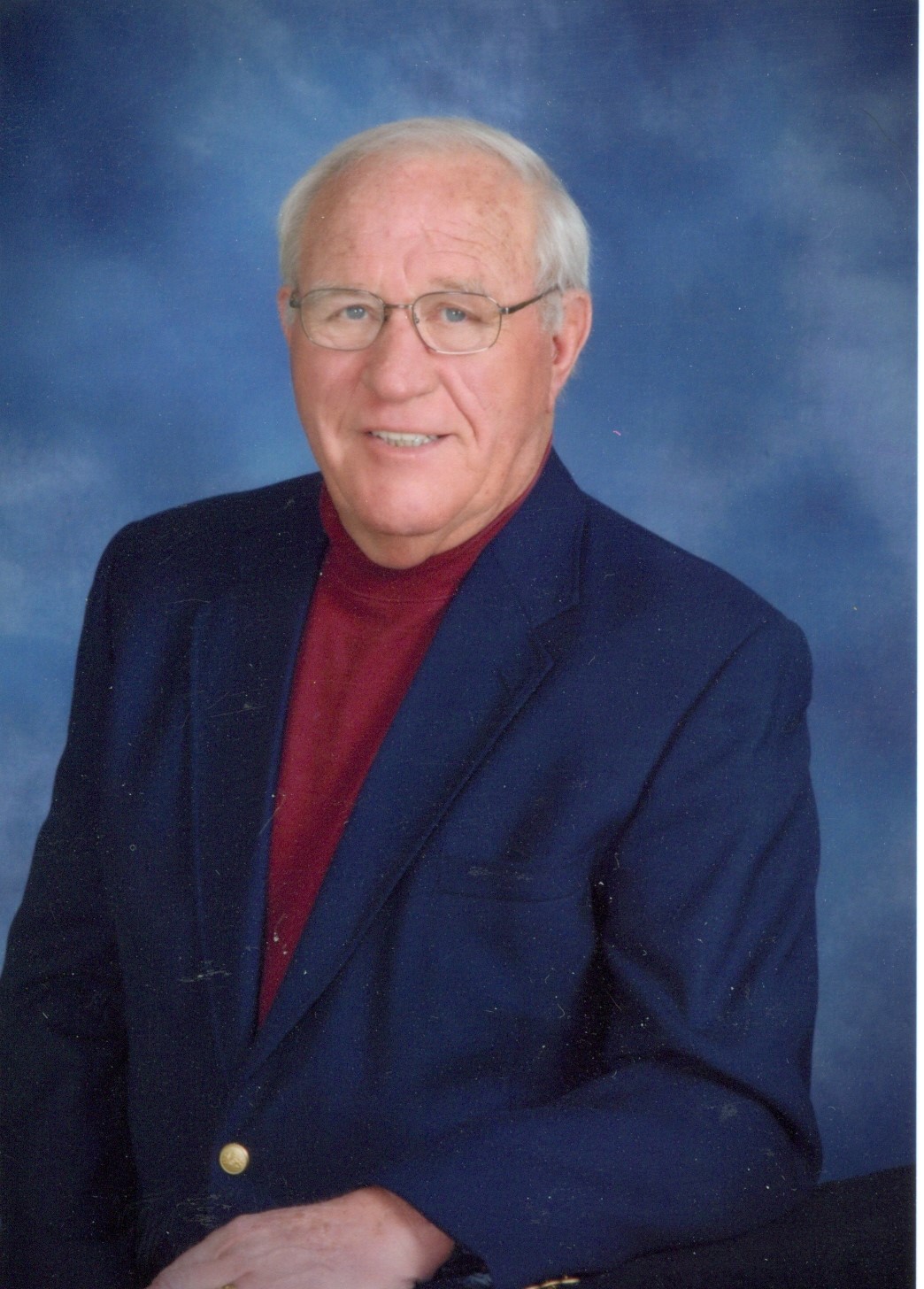
By any criteria, Ted is the father of juvenile justice in Montana, and his contributions to the field are still evident today. Ted began his career as a child protective services worker, providing protection and care for abused and neglected kids. He moved to the juvenile justice system and became the Chief Juvenile Probation Officer for the 13th and 22nd judicial districts. He was responsible for the youth court in the counties of Yellowstone, Big Horn, Carbon, and Stillwater. He remained in this position for 27 years, when he retired took a position as the director of Rebound Youth Treatment Facility in Deer Lodge.
When Ted became the Chief Juvenile Probation officer, there was no significant juvenile justice system or infrastructure in Montana. Juveniles were held in adult jails, had few rights, and there was no clear guidance or regulations to govern the care of juveniles across the state. Ted became involved with the emerging Youth Justice Council of the Board of Crime Control and was a key stakeholder in implementing the Juvenile Justice and Delinquency Prevention Act in Montana. This act provided for humane practices in juvenile custody and courts and ensured that juvenile justice focused on care and rehabilitation. Working as an advocate to pass, implement and improve the Montana Youth Court Act was one of Ted’s proud achievements. He worked tirelessly with Candace Wimmer, Mike McGrath, and other advocates to ensure that humane and effective juvenile justice practice became law.
However, juveniles were still held in local county jails. After tragic circumstances, Ted engaged other stakeholders and began working tirelessly to develop a safe juvenile detention facility in Yellowstone County. It took years, but he was able to establish the first juvenile detention facility in Montana. The innovative model of the facility collocated a juvenile specific detention center with a youth shelter care facility. Upon his retirement from the County in 1997, the facility was renamed the Ted Lechner Youth Services Center. Ted has spent many years as an active board member of the Center and still constantly advocates for youth.
Ted believed that he had a responsibility to educate and motivate society to care about the plight of youth in the juvenile justice system. He would meet with any judge, businessman, church group or civic organization. He humanized delinquent youth and their families, and taught people to care enough to act. Ted also served his community with membership on placement committees, foster care review, and he was a tireless advocate for the care and treatment of delinquent youth. He was instrumental in the development and implementation of mandatory licensing standards for juvenile facilities, and a strong advocate for meeting the mental health needs of kids in the system. He served on countless boards and work groups at the local and state level during his career and after his retirement.
Ted was instrumental in the creation of many youth programs that are still in existence today. He was a tireless and passionate stakeholder who helped to create and implement programs. He helped to create the Tumbleweed Runaway Program, and the Spring Creek Day Treatment Pilot Program. He assisted with the creation of Family Support Network, serving parents who were struggling with child abuse. Ted also spearheaded the effort to implement the Balanced and Restorative Justice Model in Montana and worked to get BARJ codified in the Montana Youth Court Act. It remains a foundational and guiding principle in Montana juvenile justice.
Ted taught, coached, and mentored countless juvenile justice professionals. Many people began their careers under his tutelage and went on to make significant contributions in juvenile justice. His beliefs, his values, and his sheer dedication to youth and families have informed the practice of countless others. Chief among these beliefs is the idea that youth in the juvenile justice system, abuse and neglect system, and mental health system are OUR youth. That we, as community members, must constantly work toward care and the provision of services to allow youth to succeed, no matter their circumstances.
One would be hard pressed to find anyone else who could be described as the father of juvenile justice in Montana. He gave more than five decades of his time and attention to the cause of juvenile justice and his contributions are still in evidence today. In short, his career is an example of a Lifetime Achievement, and certainly worthy of this honor.
2021 Innovative Community Improvement Award Recipient
Tara Cook
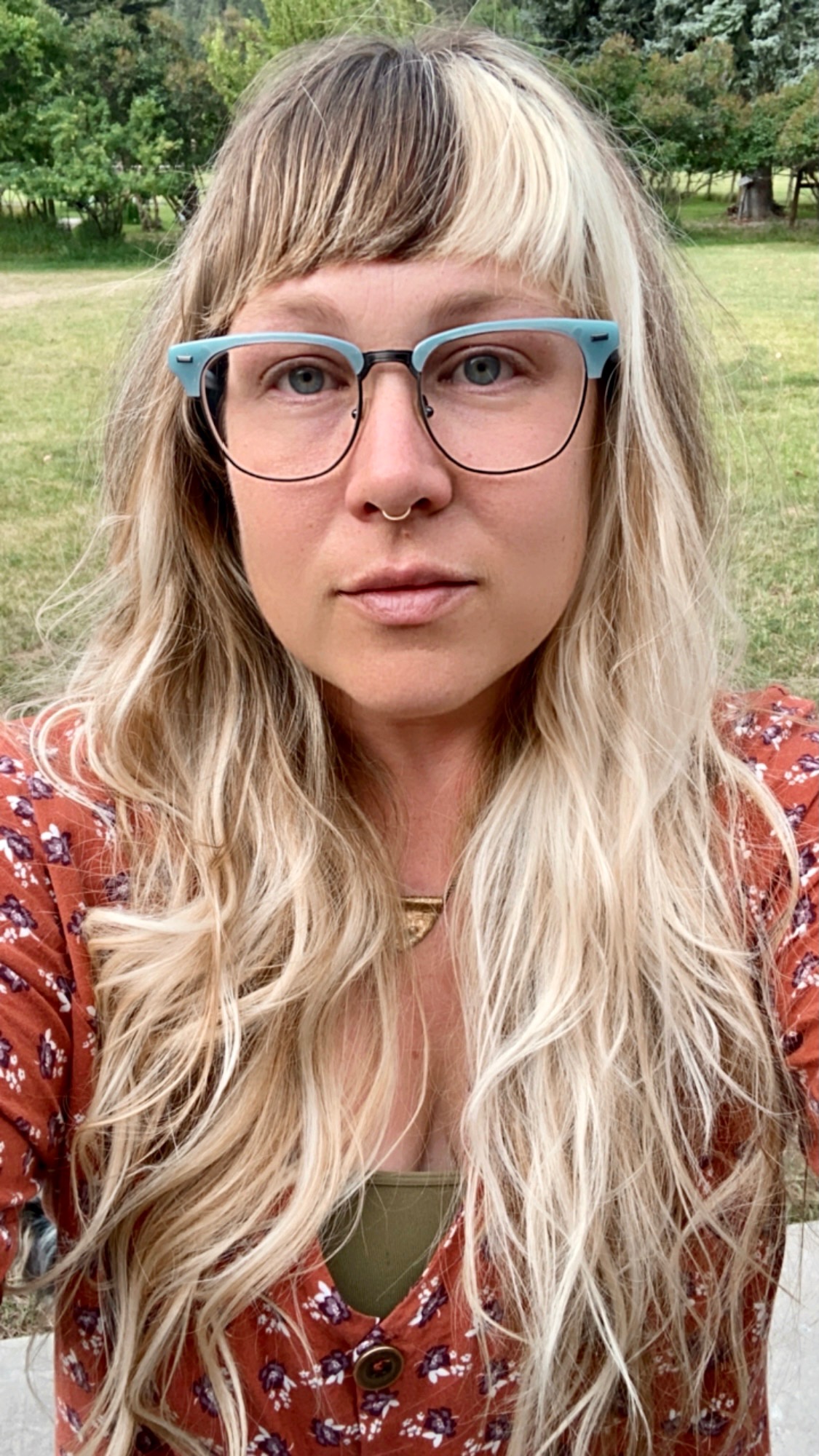
Tara Cook lived among adjudicated teens in the forests of Montana for many years prior to Missoula's sudden loss of its evidence-based crises diversion backpacking program. With a background in Philosophy and hard life lessons, Tara helped youth navigate their emotions, community conflicts, and paths forward in life through metaphors discovered in the wilderness. When Medicaid cuts resulted in the program being cut from Youth Homes in 2017, Tara launched into completely new professional territory to ensure outdoor therapeutic programming remained accessible for youth involved in Child Protective Services and Youth Court.
With zero experience in business management, accounting, media, program coordination, or non-profit management, Tara leaned on the knowledge she gained from her own personal work in the woods with struggling youth and collaborated with the former program therapist to ensure a single summer did not go by without providing the diversion program for youth on track to years of incarceration. With Youth Court funding paying for food and insurance costs, Tara coordinated 4,000 hours of volunteered program staffing, helped secure permits, insurance, DPHHS licensing, medical training, and legal documentation for Inner Roads to become an independent non-profit, in full operation as of 2018. Through endless self-teaching, internet searches, and a relentless belief in every person's potential, Tara alone provides Inner Roads with all accounting, legal permitting, state licensing applications, media marketing and fundraising, program safety policies and procedures, logistical coordination, food shopping, gear repair, wildfire and medical emergency response services, certified de-escalation and restraint training, staff management, and emotional support for the Program Therapist, while working second and third jobs in order to make a living wage in Missoula.
Inner Roads is a small but mighty service that has offered an empowerment-based intervention for youth involved in the court system and has become a self-sustaining non-profit under her management. It would simply not exist without Tara Cook's time, determination, execution, and vision.
To find out more about Inner Roads, Inc., please visit: https://www.innerroadsmt.org/
2020 Award Winners
2020 Lifetime Achievement Award Recipient
John Strandell
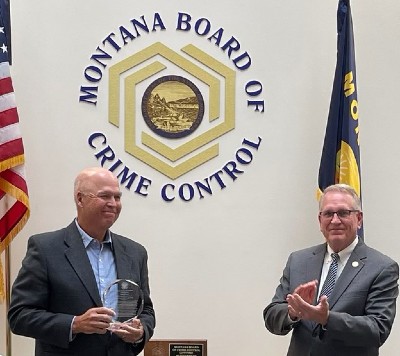
John started his career in law enforcement at Dawson County Sheriff's Office in 1976, rose to sheriff in 1977, then became a bureau chief for the Montana Department of Justice's Division of Criminal Investigation since 2003. Throughout his 44-year career, John examined and initiated on MT DOJ programs that investigated cyber crimes, Internet Crimes Against Children (ICAC), human trafficking, and social security fraud. He launched a special task force to examine the issue of sexual assault evidence kits that law enforcement had never submitted to the state crime lab for analysis, he provided state-of-the-art investigation tools to his agents, and he continues to serve as an appointed member of the Public Safety Standards and Training (POST) Council where he leads a subcommittee tasked with making recommendations to sanction officers who fail to uphold POST standards.
The Montana Board of Crime Control honored John Strandell with the 2020 Lifetime Achievement Award during the June 10th Board Meeting. Former Attorney General Tim Fox, who nominated John for the prestigious award, spoke to the impeccable character, unshakable calm demeanor, and exceptional leadership John displayed throughout his career. While Bryan Lockerby, Division Administrator for the Division of Criminal Investigation, was unable to make it in-person, he recorded a video congratulating John and thanking him for his contributions to public safety throughout Montana.
2020 Innovative Community Improvement Award Recipients
Gayle Butler,
Marisa Britton-Bostwick,
Teri Gochanour, and
The Montana Correctional Enterprises (MCE) CAMPP MT Team
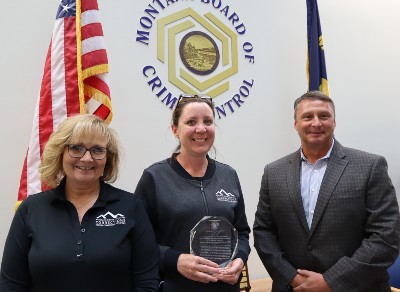
Cynthia Wolken, Deputy Director of the Montana Department of Corrections, nominated Gayle Butler, Marisa Britton-Bostwick, Teri Gochanour, and the Montana Correctional Enterprises (MCE) CAMPP MT Team for the 2020 Innovative Community Improvement Award for their work on the Connecting Adults and Minors through Positive Parenting program. The CAMPP MT team reunites incarcerated fathers with their children through a 12-week evidence-based program that culminates with a three-day "camp." Marisa and Teri accepted the award on behalf of the MCE CAMPP MT Team. Brian Gootkin, Director of the Montana Department of Corrections and a member of the Board, congratulated the CAMPP MT Team for providing children of offenders a better chance to grow up at home with their families rather than in Montana's foster care system.
